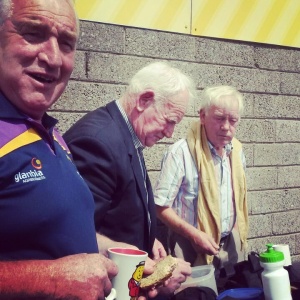After a seven hour flight, I finally connected to WiFi in Newark airport and the news came in – not guilty, six times over. My chest tightened and I couldn’t stop the tears from falling down my cheek. Tears for her, tears for my friends, tears for a broken system.
Nobody – absolutely nobody – except for the young woman who made the complaint and the four defendants know the full truth of what happened in the early hours of that fateful summer morning almost two years ago. At best we can only speculate from the information in the media and form our own opinion, and when it comes to this trial, everyone seems to have one of those.
What we do know though, is that a girl who left the home of Paddy Jackson left feeling violated, bleeding and by Rory Harrison’s own admission “in hysterics”. We all know the rest. We know she was treated appallingly. We all know about the messages exchanged among the defendants the next day. We all know the vile chauvinist tones that reverberated throughout their content. Some may argue that the messages were normal lads banter, that similar content can be found in every WhatsApp group up and down the country, that they’ve “seen worse”. Maybe that is true and if it is – well, therein lies the problem.
What frustrated me most about the case was the age-old stereotypes, misinformation and myths surrounding rape and quite frankly, the gross lack of knowledge the general public seem to possess concerning rape, sexual violence and the court system. The ignorance surrounding such a sensitive and significant topic is actually frightening. I’d like to address some of the questions and misconceptions that I came across time and time again from friends, family and the occasional randomer:
This was suggested as a motive for her coming forward more times than I care to mention. There is no monetary gain from a criminal trial.
Repeatedly, on social media platforms and even in the local pub, people stated that false allegations happen “all the time” and women “regularly cry rape” when they have actually engaged in sex they regret, are out for revenge, acting out of malice or just creating a fantasy. This is simply not true. Fabricated assaults and rapes account for 2% – 8% of all allegations – this varies slightly from country to country obviously but almost always within those figures. This figure is no higher than false allegations for other crimes such as burglary or theft yet victims of the latter are not treated with the same suspicion as someone coming forward to report a sexual assault. In 2017, 12,388 calls were made to the Rape Crisis Centre in Dublin alone.
In addition, most people who make false claims do not name a perpetrator. The majority of the time people who do make false claims tend to give an ambiguous description of events about a stranger. False allegations are also normally unveiled early on in the reporting process, often by confession of the person making the accusation. So YES, false allegations certainly do happen and have serious repercussions for the person who is wronged. But please remember they are extremely rare and disproportionately reported in the media.
- How the court process works for victims:
“For the most part in rape cases, the complainant is sitting there really on their own. The prosecution have a job of work to do,” explains Noelene Blackwell, CEO of Dublin Rape Crisis Centre.
In a rape trial, the prosecution, who act on behalf of the State, call on the complainant as a witness only. The prosecution cannot be seen to be coaching the complainant in any way or favouring him/her in case this is seen to obstruct the defendant’s right to a fair trial. On the contrary, the accused is usually represented by an entire legal team, made up of very skilled, experienced barristers.
There is certainly room for improvement from a victim’s perspective here – a complainant should be entitled to their own legal representation.
The issue of anonymity is a tricky one. Scores of people on social media expressed concern as to why the defendants in the Belfast rape trial were named, while the complainant’s identity is kept “secret” and also, following the acquittal of the four men, why her right to anonymity remains in place.
Well here’s how it works (in very simple terms):
In the Republic of Ireland, both the complainant and defendant are entitled to anonymity.
Irish law states that those accused of rape can only be identified publicly if convicted and then only if the victim waives their right to anonymity and the trial Judge consents.
In Northern Ireland, where the case took place, once charged, the defendants can be named in the media while the complainant, regardless of the verdict of the trial, is entitled to lifelong anonymity. This may seem unjust but there are valid reasons behind this.
There are strong arguments for and against the right to anonymity for defendants in rape cases. If the defendants are acquitted of the crime or falsely accused, they have still been “tarnished”and no doubt suffered grievously throughout the trial process, even if found not guilty.
In the case against anonymity, one could argue that it is in the interest of the public to know the name of the defendants/suspects once they have been officially charged and the decision has been made to prosecute. This is complex – on one hand, it may seem unfair that someone can be named and be dragged publicly through a trial before any verdict has been reached.
On the other hand, naming a defendant can encourage other victims of serial offenders to come forward (think Jimmy Saville, Rolf Harris, Bill Cosby) and also, if the accused remained anonymous, and did re-offend while awaiting trial or out on bail, there would also be a backlash from the public as to why the offenders identity was not known if he/she was a danger to society in the interim before trial.
In this particular case, the anonymity that the complainant would have been assured she would receive proved void. Unlike the Republic where trials surrounding sexual crimes are closed off to the public, in the North, anyone can sit in to the public gallery and watch court proceedings.
According to an article written by Irish Independent reporter Nicola Anderson who attended the trial, the decorum of some attendees sitting in the public gallery was quite distasteful, particularly over the eight days the young woman was giving her evidence :
“At several points of her testimony, there were jeers and scoffs from family members of the accused. “Choking on her lies,” said an older woman amid satisfaction at one stage.”
Several more people sitting in the public gallery were “day-trippers” to the courtroom – one couple had been visiting the Titanic museum and decided to drop in on the case to see for themselves, as if it were a sporting event. Another man applauded when Arthur Harvey QC, defending Blane McIlroy, finished his closing speech, as if he were performing a recital.
The complainant was deemed a ‘vulnerable witness’, meaning she was entitled to have a curtain pulled around her when giving her evidence and only the judge, the jury and the legal teams would have been in her direct vision.
However, there was a live stream from the witness box which projected her face on to a television screen that everyone who was in the courtroom could see. As members of the public could come and sit in the gallery, see her face and hear her name being spoken throughout the trial, it was not long before her identity was known across Belfast – it’s a small world after all.
The woman may not be named in the newspapers, but her name spread like fire through social media sites, online forums such as Reddit and WhatsApp groups everywhere. She is known to those who matter to her, to her circles. I myself was sent photos of at least three different girls, with each sender firmly claiming it was 100% the complainant.
If you want to talk about false claims, talk about the rumours and toxic lies about her father’s occupation and her own private past that unfolded in the cesspit that is the internet. People grasping desperately for anything to discredit her.
It should be noted it is illegal to name a complainant on social media and anyone who does so, or who calls for her to be named should be ashamed of themselves. Naming people who have made a complaint will only deter any victims of sexual violence from coming forward if they think there is a risk their identity will be revealed. While it is debatable whether or not a defendant’s name should be publicised prior to a verdict being reached, it is imperative that a complainant’s right to anonymity always remains intact.
- Stereotypes Concerning Victims and Perpetrators
Society tends to think of rapists as big bad men hiding behind bushes and dark alleys and jumping out on vulnerable prey. Violent sexual attacks by strangers do happen but they still remain the vast minority. A 2013 study from the National Rape Crisis Statistics Report showed that 91% of perpetrators of rape were known to the victim. I will write that again – 91% of perpetrators of rape were known to the victim. This means that the perpetrator is likely to be a friend, partner, lover, acquaintance or family member. This is the reality of rape – not always some “boogy man” waiting for an opportunity.
I understand that due to the high stakes and the seriousness of the allegations against the four defendants, in particular Jackson and Olding, that a thorough cross-examination of the complainant was necessary. After all, their liberty was on the line. In saying that, I took huge issue at the line of questioning of the complainant. It was misogynistic, archaic and basically what every woman fears would happen to her in court should she find herself as the complainant in a rape trial. The defence barristers re-instilled typecasts of how women “should” behave and rape victims “should” react.
Such questions posed by the defence barristers that were undoubtedly damaging to victims of sexual violence included:
Why was the girl at the party in the first place, supposedly uninvited and in the bedroom of Mr. Jackson, if she didn’t want to have sex?
Really? Who gives a shit why she was there? Even if she was a jersey puller, even if she shared a consensual kiss with him, even if she did go to his bedroom – this does not warrant consent for sexual relations. I have seen some abhorrent comments online such as “what does she expect when she wagged her tail in front of them?” The girl was clearly welcome at the party – nobody seemed to have a problem with her sharing the taxi with them or being in the house at all. She was 19 years old at the time and was celebrating the results of her exams. It is not uncommon for students or drunk people to end up at random house parties – it literally happens all. the. time.
None of the above are crimes. Rape is a crime. Sexual assault is a crime. Exposure is a crime. Withholding evidence to protect your friends is a crime. Rapists are the cause of rape – end of story.
When questioned by police, Harrison said he “guessed” rape was the reason they were being questioned. According to him, false accusations against high~profile sports stars are common. Why then was the question not asked of Jackson – why did he allow four drunk strangers (the girls) into his home? Shouldn’t he have known better than to invite two girls he just met into his bedroom? Was he not “asking for it”?
Because the rules are different for the men, that’s why. Once again, the responsibility is on us women to be careful – why did the four men have the luxury of not having to be as cautious? Women should not have to live in fear that going back to an after party will lead to something sinister.
“Why did she open her mouth – why didn’t she keep her mouth closed? Why didn’t she scream – the house was occupied. There were a lot of middle-class girls downstairs – they weren’t going to tolerate a rape or anything like that.”
This statement by Stuart Olding’s barrister Frank O’Donoghue QC in his closing speech was particularly atrocious.
During the trial, a forensic medical witness for the defence who works with victims of sexual assault was asked under cross-examination:
“Do most victims of sexual assault resist it or allow it to happen?”
She replied: “I think the evidence shows overwhelmingly that it is allowed to happen.”
The most common response to being assaulted or raped is not to fight back physically but to freeze or comply. Submission and compliance do not equal consent. It is a result of fear and a survival response by the victim to get through the ordeal. This point is vital as many victims later blame themselves for not fighting back or for not saying no. This point was highlighted by the judge, the PSNI and the medical experts in the trial. Yet, it was ignored by the defence barristers during their closing statements.
O’Donoghue’s reference to the other girls who attended the party was offensive and implied that women of a “lesser” social status do tolerate rape. A person’s background, be it rags or riches, does not mean they are exempt from being a victim of sexual violence or that they are not capable of committing a sex crime.
(Of Paddy Jackson) “Is he the type you might have had in your mind before we engaged on this eight-week programme?”
This plants the idea that there is a “type” who rapes. There is no type. Even those who like to rap, draw pictures of superheroes, do charity work and spend time with their family are capable of committing a sexual offence. Brendan Kelly QC who defended Jackson put it to the complainant that she ran with the lie of the “classic rape victim” because she got the morning-after pill the next day. What the f*** is a classic rape victim?
Judge Patricia Smyth who presided over the Belfast trial directed the jury then when considering their deliberations to remember “There is no stereotype for a rape, or a rapist or a victim of rape or how people behave after they have been raped.”
Nobody can predict how someone will react after an attack. Rape survivors do not necessarily show their emotions outwardly. Some may appear calm and blasé about the assault. Others may be hysterical. Victims of sexual assault often make statements that are incomplete, inconsistent, or even untrue out of trauma and disorientation. Trauma decreases our ability to recall events properly. These are facts.
A not guilty verdict does not equate to innocence. In a criminal trial, the burden of proof lies solely with the prosecution, in this case the CPS (Crown Prosecution Service) of Northern Ireland. The onus is on the prosecution to prove “beyond reasonable doubt” that the defendants are guilty of the charges against them and a jury are normally directed by the judge that they must reach a unanimous verdict. Not guilty does not mean a complainant is lying.
Due to the nature of sex crimes, in that they most often take place behind closed doors and come down to a he said/she said argument, it is a notoriously difficult crime to convict upon. If there is any element of doubt in the complainant’s side, the jury have a legal obligation to acquit.
In fact, it is so difficult to prove that of the approximately 8% – 10% of sexual offences that are reported in the Republic of Ireland, the DPP (Director of Public Prosecutions) rejects 70%-80% of allegations. The evidential bar for a case to go to trial is that high. Of the small percentage that do end up in court, about 40% end in acquittal. In other words, 1%-2% incidents of sexual violence that occur in this country end in the perpetrator being convicted. While the Belfast Rape Trial took place in the jurisdiction in Northern Ireland, the stats are very similar to that of the Republic. Statistics do vary depending on which sources you research, but you can take it the conviction rate is low.
Immediately following the verdict, Jackson walked out the doors of the Laganside Courts in Belfast a free man. His solicitor Joe McVeigh of KWR Law in Belfast read out a statement on Jackson’s behalf. In my opinion, the statement was incredibly arrogant and self-righteous – a chance to take a swipe at the complainant at her lowest ebb, a dig at the PSNI and an attempt to silence those who believed her version of events. Legally, Jackson has every right to defend himself having cleared his name in Courtroom 12. Nontheless, he forgot about the Court of Public Opinion and as he soon found out, when you’re an international rugby player, public opinion matters a great deal.
The tone of Olding’s handwritten statement when he left the courts was in stark contrast to Jackson’s. Olding at least had the integrity to “acknowledge the complainant came to court and gave evidence about her perception of those events“ and that he was “sorry for the hurt that was caused to the complainant.”
KRW Law threatened anyone who used the #ibelieveher hashtag would be at risk of being sued for defamation of their client, Mr. Patrick Jackson. Ugh. The #ibelieveher and #suemepaddy hashtags and protests that swept across Ireland, both North and South of the border, in Irish communities in London, New York and Brussels, were not the result of a “lynch-mob” hell bent on overturning the verdict of this trial.These rallies are so much bigger than Jackson, Olding, McIlroy and Harrison. This is about challenging a system, not a verdict. People are angry and rightly so. People are tired of immediate doubt being cast on victims when they are brave enough to speak out. People are sick of the question not being is he guilty? But instead, is she lying?
This is years and years of built-up rage at a so-called “justice” system that has failed victims over and over again. This is not a gender war. This should not be a battle of the sexes. Women are not “hysterical feminazis” out to get men. 98% of sexual assaults to both men and women are committed by men . So if men feel targeted, it’s because they’re the target audience. We know it’s #notallmen. We know it’s not even most men. But we know it’s men.
Defendants, as a human right, are entitled to a fair trial – but victims should get a fair trial too. When asked under oath why she would not go to the police if she were raped, a friend of the complainant replied:
“Because of what’s happening in this room. It’s daunting. It’s quite horrible and you get blamed.” Preach.
Since the verdict was announced two weeks ago, social media has been a hotbed of viscous commentary, each side adamant they are correct in their beliefs and their assertions. There’s no in between – you either believe them, or you believe her. Women are sluts, men are bastards. I’m right, you’re wrong.
Many commentators on Twitter and Facebook seem to think that the four defendants being declared not guilty means this is a hard-earned “victory” for “their side”. But there are no winners here. Nobody has walked away from this unscathed. All four men and their families have paid a hefty price for their callous actions and treatment of the girl. They have felt the full wrath of an outraged public. They may be free men in the eyes of the law but they will never be free from this case. Whether you believe that the complainant consented to sexual activity or not, nobody can deny the men behaved shamefully.
The Irish Rugby Football Union (IRFU) and Ulster Rugby face a tough challenge now – should they reinstate Olding and Jackson? Damned if they do and damned if they don’t. Even if we don’t like it, we must accept that the pair were not on trial for their morals or their derogatory view of women. They were on trial for rape charges and they have been acquitted on those charges. Still though, this cannot be played down as “silly mistakes” or “drunken banter” – we will not forgive and forget that easily.
Jackson has since made another statement. This second statement echoed the sentiments of Olding’s – regret for the events of that morning, regret that the woman left his home distressed. Nine days after his original statement, it remains to be seen whether or not this follow-up apology may be too little too late and have fallen upon deaf ears. Did this statement come from genuine remorse or from self interest? I don’t know.
Would vying for their blood forever more make anyone feel better? Would it make her feel better? Would it mean justice has been served if they don’t play rugby again? What is to be accomplished by subjecting them to a barrage of online abuse? These are the questions we need to ask ourselves.
If Olding and Jackson are to be afforded the privilege of donning the jerseys of their country and province again, then I can only hope that they will set a precedent for young men – dire actions result in dire consequences. That they will stand shoulder to shoulder as a reminder to men to speak up when they hear their peers talking little of women. As a reminder that the only thing necessary for evil to triumph is for a few good men to do nothing. That they will learn from this.
The woman, no doubt, has endured an unbearable ordeal for a long time. I’m sure she will find it very difficult to resume to what once was normal life for her. She has been branded. In the morning after the night before, she wrote her friend about reporting the rape – “it will serve no purpose for me but be embarrassing.”
Girl, it did serve a purpose. Glimmers of hope have stemmed from this harrowing affair and it is only the beginning. She may have lost a decision in court but her courage has exposed these men to all. She has awoken a nation. She has prompted a long overdue discussion and review of both consent and our justice system – we all owe her our gratitude.
On her first day giving evidence, the woman testified that going to the police was “the best decision she has made.” Despite the outcome of the trial, the woman, although upset by the verdict, told the investigating PSNI officer that she did not regret coming forward. She was given a voice. She told her story. She was listened to. She is believed.
I believe her.
Dublin Rape Crisis Centre: For support and information related to rape and sexual violence, please ring our National 24-Hour Helpline: 1 800 778 888










